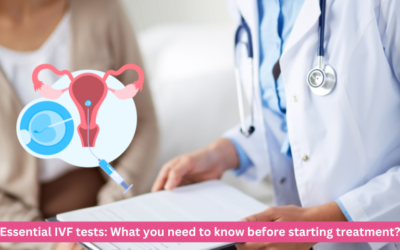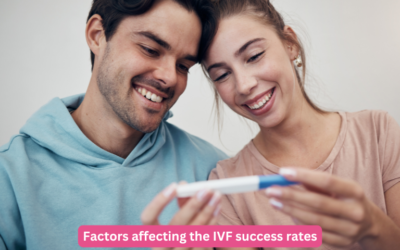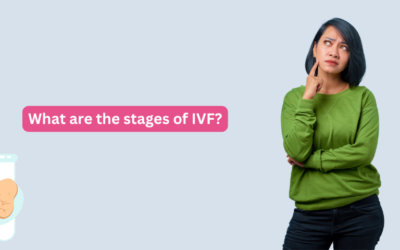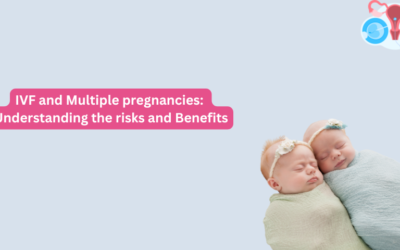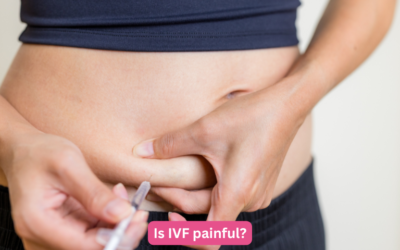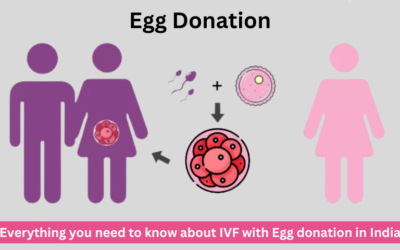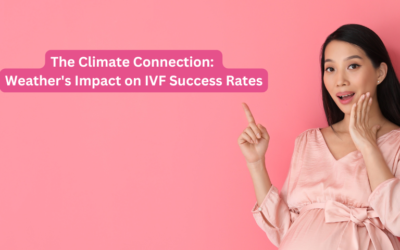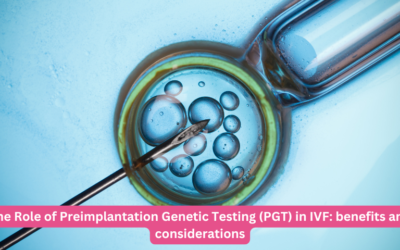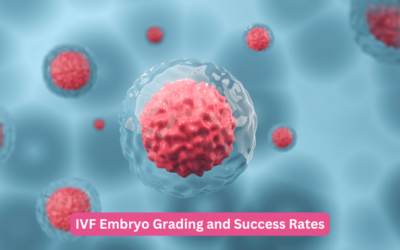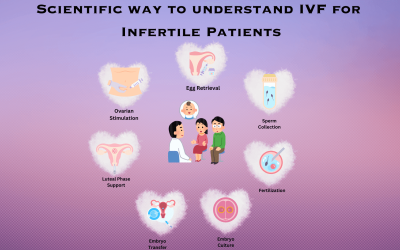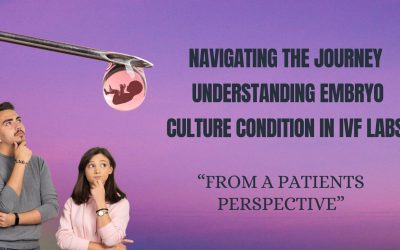Navigating the journey to parenthood can be a complex and emotional experience, especially when considering assisted reproductive technologies like in-vitro fertilization (IVF). One of the most frequently asked questions is about the ideal age for undergoing IVF. This blog aims to provide a comprehensive overview of the age factors affecting IVF success and to guide you on this vital decision.
What is the right age for a woman to conceive?
Generally, women are most fertile in their 20s to early 30s. During this period, the quality and quantity of eggs are at their peak, increasing the chances of natural conception. However, as women age, particularly after 35, fertility begins to decline. By the time a woman reaches 40, the chances of conceiving naturally drop significantly.
Why did IVF become mandatory for conceiving?
IVF has become a crucial option for couples facing infertility due to various factors, including:
- Age: Delayed childbearing due to career or personal choices often leads to fertility challenges.
- Medical conditions: Issues such as endometriosis, polycystic ovary syndrome (PCOS), and other reproductive disorders can make natural conception difficult.
- Genetic concerns: IVF allows for preimplantation genetic testing, ensuring a healthier pregnancy.
As a result, IVF has become a necessary tool for many couples aiming to conceive.
Right age for IVF – Does age matter the most?
Yes, age is a significant factor in IVF success rates. Women under 35 have higher success rates with IVF compared to those over 40. However, age is not the only determining factor. Overall health, reproductive history, and lifestyle choices also play crucial roles.
Upper age limit for IVF in India
In India, there is no specific legal age limit for IVF treatment, but most clinics recommend that women should ideally undergo IVF before the age of 50. However, individual circumstances vary, and many factors influence the decision.
IVF in Advanced age – CONS
While IVF can be an option for women over 40, it comes with certain challenges:
- Reduced egg quality: Older eggs may lead to lower fertilization rates and increased chances of genetic abnormalities.
- Higher miscarriage rates: The risk of miscarriage increases with age, particularly after 40.
- Multiple pregnancies: Advanced maternal age raises the likelihood of multiple pregnancies, which can pose risks to both mother and babies.
Why IVF?
IVF offers numerous benefits:
- Increased control: Patients can control the timing of their pregnancies.
- Enhanced success rates: Advanced reproductive technologies improve the chances of conception, even for older women.
- Addressing infertility causes: IVF can overcome several infertility issues that prevent natural conception.
Beyond age limits: Other considerations
While age is essential, other factors should be considered when deciding on IVF:

- Health conditions: Underlying health issues can affect success rates.
- Lifestyle choices: A healthy lifestyle enhances fertility and the chances of a successful IVF cycle.
- Emotional readiness: IVF can be emotionally taxing; mental well-being is crucial.
What is the connection between age and infertility?
As women age, their egg supply declines, and egg quality decreases, which leads to:
- Fertility decline: Difficulty in conceiving naturally.
- Higher risk of genetic issues: Increased risk of chromosomal abnormalities in embryos.
Preparations for an IVF Cycle
Proper preparation is essential for a successful IVF cycle. Key steps include:
- Medical evaluation: Comprehensive health assessments for both partners.
- Lifestyle changes: Adopting a healthy diet, exercise routine, and stress management techniques.
- Fertility medications: Discussing the use of hormonal medications to stimulate egg production.
Success of IVF after 40
Success rates for IVF after 40 are lower compared to younger women, but not impossible. Factors that can enhance success include:
- Using Donor Eggs: Younger eggs can significantly increase the chances of a successful pregnancy.
- Advanced ART Methods: Techniques like preimplantation genetic testing can improve embryo quality.
Who is the right candidate for IVF?
IVF may be suitable for:
- Couples with unexplained infertility.
- Women with fallopian tube issues or endometriosis.
- Individuals with genetic concerns wanting to screen embryos.
Advanced ART methods can improve success rates
Innovations in assisted reproductive technology (ART) such as:
- ICSI (Intracytoplasmic Sperm Injection): Directly injecting sperm into the egg.
- Cryopreservation: Freezing embryos for future use can improve overall success rates.
Risks of IVF
While IVF is generally safe, it carries certain risks, including:
- Ovarian Hyperstimulation Syndrome (OHSS): A condition resulting from excessive response to fertility medications.
- Multiple pregnancies: Higher risk of complications from twins or triplets.
- Emotional stress: The IVF journey can be emotionally challenging.
How do you prepare for IVF ?

Preparing for IVF involves a multi-faceted approach:
- Medical preparation: Follow your doctor’s advice for medications and treatments.
- Mental health: Consider counseling or support groups.
- Physical health: Maintain a healthy weight and lifestyle.
What can you expect ?
During the IVF process, patients can expect:
- Frequent Monitoring: Regular blood tests and ultrasounds to monitor egg development.
- Emotional Support: Guidance and reassurance from medical staff throughout the process.
Younger eggs increase the chances for IVF success
Younger eggs generally have higher quality and better viability, which is why many clinics recommend using donor eggs for women over 40. This strategy can significantly enhance the likelihood of a successful IVF cycle.
Legal guidelines and New laws for IVF in India
Recent laws in India govern IVF practices, ensuring ethical standards and protecting patients. These laws cover issues such as donor anonymity, compensation, and the rights of all parties involved in the IVF process.
Tips for a healthy pregnancy using IVF
- Follow a Balanced Diet: Prioritize fruits, vegetables, whole grains, and lean proteins.
- Stay Hydrated: Adequate water intake is essential.
- Manage Stress: Incorporate mindfulness practices or yoga.
- Regular Check-Ups: Attend all scheduled appointments with your healthcare provider.
Conclusion
Deciding on the right age for IVF is a personal journey influenced by various factors, including health, lifestyle, and emotional readiness. At Shukan Hospital & IVF Centre, we are dedicated to supporting you every step of the way, ensuring that you have the information and resources needed to make informed decisions about your fertility journey. If you’re considering IVF or have questions about your specific situation, reach out to our team today for personalized guidance.
Take the first step today—contact us to schedule a consultation and let our experts help you achieve your dream of parenthood.
Author bio
Dr Prakash Patel
He is a highly respected Infertility and IVF Specialist with an extensive medical career spanning over two decades. As the Director of Shukan Hospital & IVF Centre, he has dedicated his life to helping couples achieve their dreams of parenthood. He is renowned for his expertise in advanced laparoscopic surgeries and has successfully managed numerous complex cases involving recurrent miscarriages and recurrent IVF failures. His proficiency in high-risk pregnancy management and advanced IVF treatments makes him a trusted name in the field of reproductive medicine.
His approach to patient care is deeply compassionate, combining his vast clinical knowledge with a commitment to personalized treatment. He holds prestigious certifications from leading medical institutions in France and Croatia, reflecting his dedication to staying at the forefront of medical advancements. With memberships in notable organizations like FOGSI and ISAR, He is recognized both nationally and internationally for his contributions to gynecology and reproductive health.
Under his leadership, Shukan Hospital & IVF Centre has become one of the premier fertility centers in Gujarat, known for its state-of-the-art facilities and patient-centered care. His outstanding work has earned him several accolades, including the My FM Achiever Award, further cementing his reputation as a leading specialist in his field.
FAQs
What is the right age for IVF?
While under 35 is optimal, many women over 40 successfully conceive with IVF.
Can IVF be done after 50?
Yes, but the success rates decrease significantly. Consulting with a fertility specialist is essential.
Is there a guarantee of success with IVF?
No, IVF success varies depending on various factors, including age, health, and the quality of eggs and sperm.
Can IVF be used for single parents or same-sex couples?
Yes, IVF can help single parents and same-sex couples achieve parenthood, often using donor eggs, sperm, or surrogacy as part of the process.
What are the common side effects of IVF medications?
IVF medications can cause mild side effects like bloating, mood swings, or mild discomfort. Severe reactions, such as Ovarian Hyperstimulation Syndrome (OHSS), are rare but possible.
How many IVF cycles are typically needed to achieve pregnancy?
The number of cycles varies by individual. Some couples succeed in the first cycle, while others may need multiple attempts to achieve pregnancy.
Are there alternatives to IVF for treating infertility?
Yes, alternatives include intrauterine insemination (IUI), fertility medications, and surgical interventions for conditions like blocked fallopian tubes or endometriosis.
Does stress affect IVF success rates?
While stress does not directly impact IVF success rates, reducing stress through mindfulness, counseling, or relaxation techniques can improve emotional well-being during the process.
Blogs related to IVF
Essential IVF tests: What you need to know before starting treatment?
In-vitro fertilization (IVF) offers hope to many couples and individuals dreaming of parenthood. However, starting IVF requires a series of...
Factors affecting the IVF success rates
In vitro fertilization (IVF) has brought hope to millions of couples struggling with infertility. However, understanding the factors that influence...
What are the stages of IVF? A step-by-step guide by Shukan Hospital & IVF Centre
In-vitro fertilization (IVF) has opened new pathways to parenthood for those facing fertility challenges. Whether you’re considering IVF or are in...
IVF and Multiple pregnancies: Understanding the risks and Benefits
In vitro fertilization (IVF) has brought hope to countless couples seeking to build families. However, one of the more complex aspects of IVF is the...
Is IVF Painful?
For many couples struggling with infertility, in vitro fertilization (IVF) represents hope. However, one common question patients often ask is, "Is...
Everything you need to know about IVF with Egg donation in India
Becoming a parent is a cherished dream, but for some, it can involve overcoming fertility challenges. IVF with egg donation is a specialized...
What is the difference between IVF & Test tube baby?
In the world of fertility treatments, you often hear terms like "IVF" and "test tube baby" used interchangeably. This can create confusion for...
IVF after miscarriage: What you need to know
Experiencing a miscarriage can be a profoundly emotional and challenging time. For many, the journey toward parenthood does not end with a...
The Climate Connection: Weather’s Impact on IVF Success Rates
In vitro fertilization (IVF) is a highly controlled medical process, but can external factors like weather influence its success? This blog explores...
The Human Touch: Emotional and Ethical Considerations in IVF
In vitro fertilization (IVF) is more than a complex medical procedure; it represents a profound journey of hope, emotions, and critical ethical...
Modernizing the IVF Lab: Overcoming Challenges with New Innovations
In vitro fertilization (IVF) has transformed reproductive medicine, offering hope to individuals and couples facing infertility. At the core of this...
The role of Preimplantation Genetic Testing (PGT) in IVF: benefits & considerations
At Shukan Hospital & IVF Centre, we are at the forefront of advanced fertility treatments, striving to provide our patients with the best...
IVF vs. IUI: Which fertility treatment is right for you?
Navigating the path to parenthood can be both exciting and daunting, especially when facing fertility challenges. For many individuals and couples,...
5 Best IVF hospitals in Ahmedabad
Choosing the right IVF hospital is a crucial step in the journey towards parenthood, especially in a city as vibrant as Ahmedabad. With advancements...
Key Questions Every Pregnant Woman Needs to Ask Their Gynecologist
Pregnancy is an exciting journey filled with anticipation, but it can also be a time of uncertainty and questions. It's essential to have open and...
IVF Embryo Grading and Success Rates
IVF (In Vitro Fertilization) has become a beacon of hope for many couples struggling with infertility. One of the critical steps in the IVF process...
Fertility Treatments for Women with Low AMH and Regular Periods
Understanding Low AMH Anti-Müllerian Hormone (AMH) is produced by the small follicles in a woman's ovaries and serves as a marker of ovarian...
The Role of Genetics in Female Infertility
Infertility is a complex and often emotionally challenging issue that affects millions of women worldwide. Understanding the underlying causes is...
How to Prepare for Fertility Treatments: A Comprehensive Guide
Embarking on the journey of fertility treatments is a significant step towards achieving your dream of parenthood. Proper preparation can greatly...
Comprehensive Care Post IVF Transfer
The journey through In Vitro Fertilization (IVF) is both challenging and rewarding. After the embryo transfer, a critical phase begins that requires...
Scientific way to understand IVF for Infertile Patients
Introduction:Infertility can be a challenging and emotional journey for individuals and couples dreaming of starting a family. In recent years,...
Unlocking the Secrets: Epigenetics at the Core of Embryonic Development
Embarking on the extraordinary journey of embryonic development, Shukan Hospital and IVF Center stand as pillars of expertise, guiding aspiring...
Why Blastocyst Transfer for Healthy Pregnancy
Introduction:Blastocyst embryo transfer is a technique used in assisted reproductive technologies (ART), The method of transferring embryos during...
NAVIGATING THE JOURNEY ,UNDERSTANDING EMBRYO CULTURE CONDITION IN IVF LABS FROM A PATIENTS PERSPECTIVE.
Introduction:The IVF lab plays a central and pivotal role in the development of embryos during the in vitro fertilization (IVF) process. Embryo...
Demystifying Common Infertility Myths: Separating Fact from Fiction
Infertility is a condition that affects many couples who are trying to conceive a child. It is defined as the inability to get pregnant after one...
Struggling with poor ovarian reserve! Know All about it and it’s treatment!
Ovarian reserve (POR) is a condition in which the number of eggs in a woman's ovaries is less than would be expected for her age. As it can affect...
Myths and Facts About IVF
While in-vitro fertilization (IVF) is becoming increasingly popular as an effective infertility treatment, there are still some myths associated...
The Importance of Mental and Emotional Health During the Fertility Journey
During fertility treatments, the body goes through a lot, which can also impact the mind. When individuals choose to undergo in vitro fertilization...
Why India is the Best option for IVF treatment?
In vitro fertilization (IVF) treatments are popular in India due to their lower costs and high success rates. Further, India is home to some of the...
Why are my Fertility Treatments ending up in failed cycles?
Fertility treatments that are not successful can take a toll on the couple, both emotionally and financially. However, the one benefit is that...
Why IVF fails. ?
According to the latest statistics from the Society for Assisted Reproductive Technologies (www.sart.org) in the year 2011, there were a total of...
Why Male and Female infertility is increasing nowadays?
Male and female infertility is caused by certain medical issues that prevent them from becoming pregnant. India has an alarming increase in...
How to choose right IVF clinic?
Top 10 tips while choosing the right IVF clinic for youIf you're considering going to a fertility clinic as your next step, do some research before...


